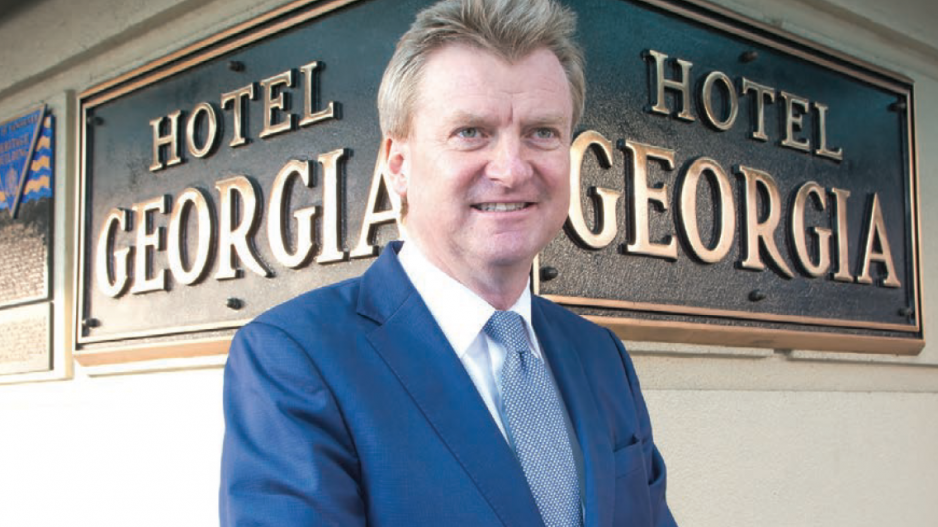It's a story frequently heard all over the region. Business people or tourists from out of town get to their hotel somewhere in the Lower Mainland, or come off a cruise ship or arrive at Vancouver International Airport. They then open their Uber app, looking to ride-hail to a conference, a dinner or out for drinks or to check into their hotel. Then they’re astonished to find out Vancouver has the odd distinction of being the only major city in North America that doesn’t allow ride-hailing (or, as it’s also known, ride-sharing).
Philip Meyer, managing director for the Rosewood Hotel Georgia in downtown Vancouver, said when out-of-town guests ask him why B.C. doesn’t have ride-hailing at all, all he can offer is “It’s complicated” as a response.
“One of the most common questions we are asked is why doesn’t Vancouver have Uber,” Meyer said, noting he worries customer satisfaction is starting to take a hit because of the lack of transportation options and long waits for cabs during peak riding times.
“Our business is international, and when it comes to production and entertainment from cities like San Francisco, New York, even Montreal and Toronto, people expect it. The taxi business cannot keep pace. Ask our doormen at the Rosewood Hotel Georgia or any hotel, restaurant or bar in town. Or take a look on a rainy December night during the holidays, during TED Talks in April or any given day during cruise ship season; these are just some examples.”
The new provincial government isn’t expected to make any announcement on the issue of ride-hailing until 2018, as a legislature committee is reviewing the subject, and an independent consultant is speaking with the taxi associations.
According to a survey done before the provincial election, 80% of Greater Vancouver Board of Trade (GVBOT) members supported the provincial government working with municipal governments to bring ride--hailing services like Uber and Lyft (which recently launched in Toronto) to the area. The GVBOT estimates ride-hailing could help reduce congestion across the Lower Mainland, which costs the economy about $1.4 billion annually.
According to Tourism Vancouver, more than 515,000 people come to Vancouver for conferences and events and stay a collective 1.5 million nights in hotels. Overnight visitors to Greater Vancouver from other countries are also up across the board. The most significant jump in third-quarter numbers is a rise in the number of guests from Australia, Germany and Mexico – all of which have ride-hailing in their major cities.
Susie Heath, a Toronto-based senior communications associate for Uber, said more than 250,000 people tried to open their Uber app in Greater Vancouver in 2017, and that the company often hears stories like Meyer’s.
“Certainly it’s a frustration that we hear quite frequently,” she said. “It’s definitely something we’re hearing constantly, anecdotally. At various hotels they tell me it’s a daily occurrence that guests are coming out, and then waiting for taxis on a Friday or Saturday night is a big pain point for some people.”
Lyft, another ride-hailing service, recently started operations in Toronto as its first foray outside of the United States. Chelsea Harrison, a spokeswoman for Lyft, said the company has already had meetings with such organizations as the Vancouver Economic Commission and Greater Vancouver Board of Trade about ride-hailing in Vancouver. She echoed both Meyer and Heath’s statements.
“We’ve consistently heard the same message over and over: B.C. wants ride-sharing.”
When asked about a city that has a similar population and layout, Harrison offered up Boston (a coastal city with a population of 673,184) as a metropolis comparable to Vancouver, which has a population of 631,486. According to Lyft statistics, passengers in Boston generate an estimated $33.3 million in the local economy.
Lon LaClaire, manager of transportation for the City of Vancouver, said the city has had talks with the provincial government, and the main issue for the municipality is designation of ride-hailing vehicles, noting taxis in Vancouver have some special privileges such as being able to drive in bus lanes.
“Can we identify them as a taxi?” He said. “Can we treat them as a taxi? The thing is we might not be able to; we might have to have a slightly different set of rules for them.”
LaClaire added there will also be a challenge in a potential glut of ride-hailing cars in and around hot spots waiting for calls on the app once the service is approved.
“The other piece is how we manage access to the road network,” he said.
Another flashpoint has been the Vancouver airport’s international arrivals terminal, where fliers from different countries can land in a city where there is no ride-hailing, and they also don’t speak the language. Brock Penner, manager of corporate communications for the Vancouver Airport Authority, issued an email statement noting the authority’s support of ride-hailing apps like Uber and Lyft.
“Ride-sharing can offer an important customer service and additional choice to passengers if it is enacted in a way that creates a level playing field between the current taxi industry and new providers,” Penner said. •




